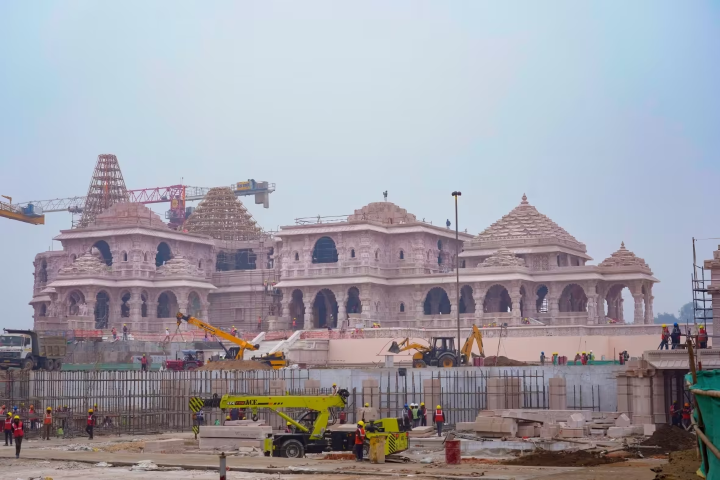
The ongoing construction of the Ram Mandir is situated on a site revered by many Hindus as the birthplace of the god Ram. This location was previously occupied by a mosque for centuries until it was destroyed by a Hindu mob in 1992. (Photo by Deepak Sharma/The Associated Press)
In the sacred city of Ayodhya, religious chants resonated through loudspeakers as thousands of devotees gathered for the inauguration of Ram Mandir, India's largest Hindu temple. Despite ongoing construction frenzy and unfinished sections, the temple's opening on Monday will witness Prime Minister Narendra Modi consecrating the site alongside Hindu priests, placing an idol of Lord Ram in the inner sanctum.
Built on contested ground, where a 16th-century mosque once stood, the temple fulfills a long-standing Hindu nationalist pledge led by Modi's Bharatiya Janata Party (BJP). The site's history includes the destruction of the Babri Masjid in 1992, triggering communal riots. In 2019, India's Supreme Court awarded the land to Hindu groups, marking a significant victory for the BJP's promise to return it to Hindus.
The dedication to the temple's construction, championing one side in a longstanding dispute, is seen by many as a departure from India's secular ideals. Modi's public display of religious practices ahead of the inauguration underscores the government's alignment with Hindu sentiments.
While the event has garnered enthusiastic support, opposition leaders label it a political stunt, criticizing the incomplete state of the temple. Some Hindu head priests also dissent, citing religious scriptures against consecrating an unfinished temple.
Despite the controversy, private jets are booked for VIPs, including industrialists and Bollywood stars, to attend the ceremony. Schools are closed in Uttar Pradesh, where Ayodhya is located, and live screenings will be held across India and at embassies worldwide.
For devotees like 62-year-old Paryag Garg, the temple represents a "dream come true" for all Indians. However, Ayodhya's Muslim community, residing in a city where their families have lived for generations, feels sidelined. The Supreme Court ruling mandated a replacement mosque, but the allocated plot is distant and controlled by the government, raising concerns among Muslims about their future in the city.
Ayodhya-based paralegal Khaliq Ahmad Khan notes a prevailing sense of unease within the Muslim community, fearing potential violence after the departure of dignitaries. The perception of government favouritism towards Hindus adds to their concerns, heightening feelings of helplessness.
Political analysts view the temple inauguration as a strategic move by Modi's BJP, reinforcing the party's Hindu-first narrative ahead of the upcoming national election. The ceremony serves as a visual reminder of the BJP's commitment to Hindu interests, potentially influencing voters and contributing to Modi's bid for a third consecutive term.















